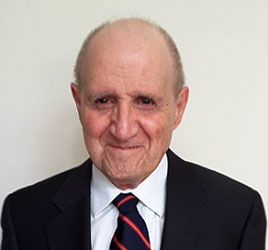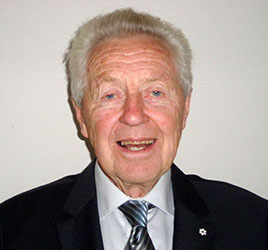The Royal Military College of Canada is very proud to announce that Dr. Ronald D. Weir will receive a Doctor of Engineering honoris causa and Dr. John W. Hilborn will receive a Doctor of Science honoris causa at our 113th Convocation at 1400 hours on 16 November 2018.
Dr. Ronald D. Weir

Dr. Weir was born in Saint John, New Brunswick, Canada, and obtained a B.Sc. degree at the University of New Brunswick, and DIC and Ph.D. degrees from Imperial College of Science, London, U.K. From 1966 to 1968, he was a Research Fellow at the National Research Council in Ottawa. In 1968, he joined the teaching staff of the Department of Chemistry and Chemical Engineering at the Royal Military College of Canada as a military officer (Captain, then Major) and as Assistant Professor. He was appointed Professor in 1981. From 1990 to 1995, he was Head of the Department, then became Dean, Graduate Studies and Research (1995-2003), Acting Dean, GS&R (2006-2007), Associate Director, Defence Security Research Institute, and Associate Vice-Principal Research and Dean Graduate Studies (2011-2012). He was appointed on several occasions as Senior Research Visitor and Visiting Professor at several universities including University of Michigan (Ann Arbor) and Queen’s University in Kingston. His areas of specialization include Chemical Thermodynamics, Chemical Engineering (statistical), Process Modelling, Simulation, Optimization, Applied Mathematics for Engineers, Heat, Mass, Momentum Transfer, Fluid Flow and Fluid Mechanics, Materials Science, Engineering Materials, Crystal Structure, and Environmental Engineering.
He taught more than 10 different courses over the years both at the undergraduate and graduate levels, with many of these courses among the most challenging offered at RMC. His service to RMC included his involvement in an unusually large number of committees both as Chair and Member, particularly the undergraduate students’ admission committee for which Dr. Weir spent countless hours assessing application files and making recommendations on the suitability of the applicants to RMC from the academic viewpoint. As Dean of Graduate Studies and Research, he was involved in the admission of students for the PG programmes. His CV lists more than 37 occurrences of service to RMC. Even after his retirement, Dr. Weir continued to support RMC through his participation to special committees, notably as an advisor for the refuelling of the SLOWPOKE-2 nuclear reactor at RMC. His efforts, with those of the other members of this committee, had a positive conclusion since DND has agreed to acquire a new core for the reactor and has identified the funding for this important commitment. Outside RMC, Dr. Weir has been involved in many committees such as a member of the Ontario Council Graduate Studies (OCGS) and as a member of the Ontario Council University Research. He was active with the Canadian Society for Chemical Engineering (CSChE), being, among others, one of the organizers of the CSChE Conference in Kingston in 1996. He has also been Editor for many publications such as the Journal of Chemical Thermodynamics and Pure and Applied Chemistry. He has acquired an international reputation not only through his first class research and his active role as organizer of conferences and conference sessions, but also from his involvement with several international learned societies and agencies. A prime example of this is his duties with the International Union of Pure and Applied Chemistry (IUPAC), where he served and still serves as Member of the Editorial Board of the Pure and Applied Chemistry Journal, Chair of the IUPAC Interdivisional Committee on Term, Nomenclature and Symbols, and Chair IUPAC Projects Evaluation Committee. He became President of IUPAC Division I Physical & Biophysical Chemistry. n addition, he served as President and Past President of the International Association of Chemical Thermodynamics. His efforts have been recognized with several honours and awards, such as the RMC Teaching Excellence Award (twice: 1992-1993 and 2005-2006), and four Appointments as Fellow of prestigious learned societies: Royal Society of Chemistry (FRSC), Chemical Institute of Canada (FCIC), Engineering Institute of Canada (FEIC) and International Union of Pure and Applied Chemistry (FIUPAC).
Dr. Weir’s research has been intense throughout his career, with an impressive publication record. A total of 97 papers have been published in refereed journals in the category of Disciplines of Chemical and Materials Engineering , plus 56 in refereed journals in the category of Disciplines of Environmental Sciences and Engineering. In these categories, he has published one and four books, respectively. He has contributed to chapters of five other refereed books. His C.V. lists one publication in Conference and Symposium Proceedings (refereed), and 65 presentations at major conferences and symposia (of which 55 were refereed). In addition, Dr. Weir has been and still is intensely involved in the review of books, journal paper manuscripts and research grant applications, with about 30 to 45 journal manuscripts reviewed each year. He has obtained several research grants from DRB, CRAD and ARP mostly, and he has supervised important contracts awarded to RMC such as DGNS/DNSC SWIPE test programs for radioactive contamination monitoring.
At the undergraduate level, Dr. Weir considered the officer cadets as his top priority and would always give the students the time necessary for them to master the content of the important undergraduate courses taught by him. The students and his colleagues hold him in very high esteem. He served from 1990 to 1995 as Head of the Department of Chemistry and Chemical Engineering, the largest at RMC with combined Faculty, support staff and student population then between 100 to 150 persons. Both the undergraduate and the graduate programs were undergoing important changes at that time. In 1995, he became Dean of Graduate Studies and Research, just after the Ph.D. programme was initiated at RMC. In the following years, a multitude of changes occurred to the Graduate School, such as the registration of the first civilian and female graduate student at RMC, the increase of the size of the Graduate School following the closure of the Collège militaire royal de Saint-Jean and the Royal Roads Military College, with part of their teaching staff transferred to Kingston, the recognition of RMC by the Ontario Council Graduate Studies, and the eligibility of the RMC Faculty members to apply for and be awarded research grants by the Natural Science and Engineering Research Council (NSERC). Dr. Weir played a major role in enabling these changes to be implemented. As part of his many efforts, Dr. Weir convinced some departments at RMC to offer academic programmes previously taken by sponsored graduate students at very high costs in the U.S.A. and the U.K. He then convinced top leaders of the Canadian Forces to send sponsored graduate students to take their PG programmes at RMC, and to civilian universities only when RMC could not provide the necessary graduate programmes. During his tenure as Dean, Dr. Weir tireless efforts resulted in a significant increase of the research activities at RMC. He never diminished his efforts to promote RMC abroad toward a clearly improved recognition of the value of this university throughout Canada and on the international scene. Dr. Weir has been honoured recently (2014) with the creation of the following award: the “Ron Weir Teaching Award in Engineering” given to a teaching staff member in the Engineering Faculty to recognize his or her excellence in teaching.
Dr. Weir is among the leading ornithologists in Canada, and he has been involved in a major way with the Kingston Field Naturalists and the Federation Ontario Naturalists, serving on the executive committees for numerous years. He has written several books on Canadian birds. From 1983 to 1993, he was the Ontario Editor of American Birds, published bi-monthly by National Audubon, New York. He received the 1986 Conservation Trophy from the Federation of Ontario Naturalists.
Dr. Ron Weir indeed deserves our recognition for the top quality of his work as a Faculty member and for his sustained dedication to this university, its students, his colleagues and the RMC support staff.
Dr. John Hilborn

- PhD, Nuclear Physics, McGill, 1954
- Reactor Physicist, Atomic Energy of Canada Ltd., 1954 – 1991
- Researcher Emeritus, 1991 – 1994
Dr. Hilborn was born in Preston (Cambridge), Ontario and graduated from McGill University in 1954 with a Ph.D. in nuclear physics. Dr. Hilborn began his career in the nuclear industry in 1949, at the Eldorado uranium mine in the Northwest Territories. Joining AECL at Chalk River in 1954, he participated in reactor startups of the National Research Universal reactor (NRU) at Chalk River, the Nuclear Power Demonstration reactor in Rolphton Ontario (NPD), the Whiteshell reactor (WR-1) at AECL’s Whiteshell Laboratories in Manitoba, and the Steam Generating Heavy Water reactor physics experiment (SGHW), at Harwell in England.
In 1964 he demonstrated the feasibility of the self-powered neutron detector for reactor in-core monitoring. It was patented in 1967. He was also co-founder of the manufacturer of those detectors, Reuter-Stokes Canada Ltd., now owned by multi-national Mirion Technologies (IST Canada) Inc., Cambridge, Ontario.
Dr. Hilborn’s most significant contribution to reactor research was the SLOWPOKE reactor concept which resulted in the SLOWPOKE Research Reactor, the SLOWPOKE Demonstration Reactor (SDR), and the SLOWPOKE Energy System (SES-10).
From 1972 to 1977, he headed a new branch at Chalk River to develop special methods and tools for the non-destructive inspection of CANDU pressure tubes and steam generators.
Dr. Hilborn’s long association with the Royal Military College going back to the early 1970’s, deserves special mention. As a volunteer advisor on graduate student research topics and a long-time collaborator with Professor Hugues Bonin and other staff members on published papers related to the SLOWPOKE reactor, he has contributed to a number of important advances in applied nuclear technology. In particular, the Homogeneous SLOWPOKE reactor concept for producing medical isotopes such as Mo-99, could bring affordable nuclear medicine to 80% of the world population not currently served.
In 1974 Dr. Hilborn was awarded the Eadie Medal by the Royal Society of Canada, and the W.B. Lewis Medal by the Canadian Nuclear Association. In 2013 he was awarded the Queen's Diamond Jubilee Medal; and in 2014 the W.E. Havercroft Medal, by the Canadian Institute for Non-Destructive Examination. In 2017, Dr. Hilborn was appointed to the Order of Canada.
During the past three years Dr. Hilborn has been urging AECL and the federal government to reverse the recent decisions to shut down the NRU reactor permanently, and stop fundamental nuclear research and medical isotope production at Chalk River. He proposed a new business model whereby AECL would lead a consortium enabling NRU to supply the world with medical isotopes, market them profitably, and once again make Chalk River a leading international centre for neutron scattering research.